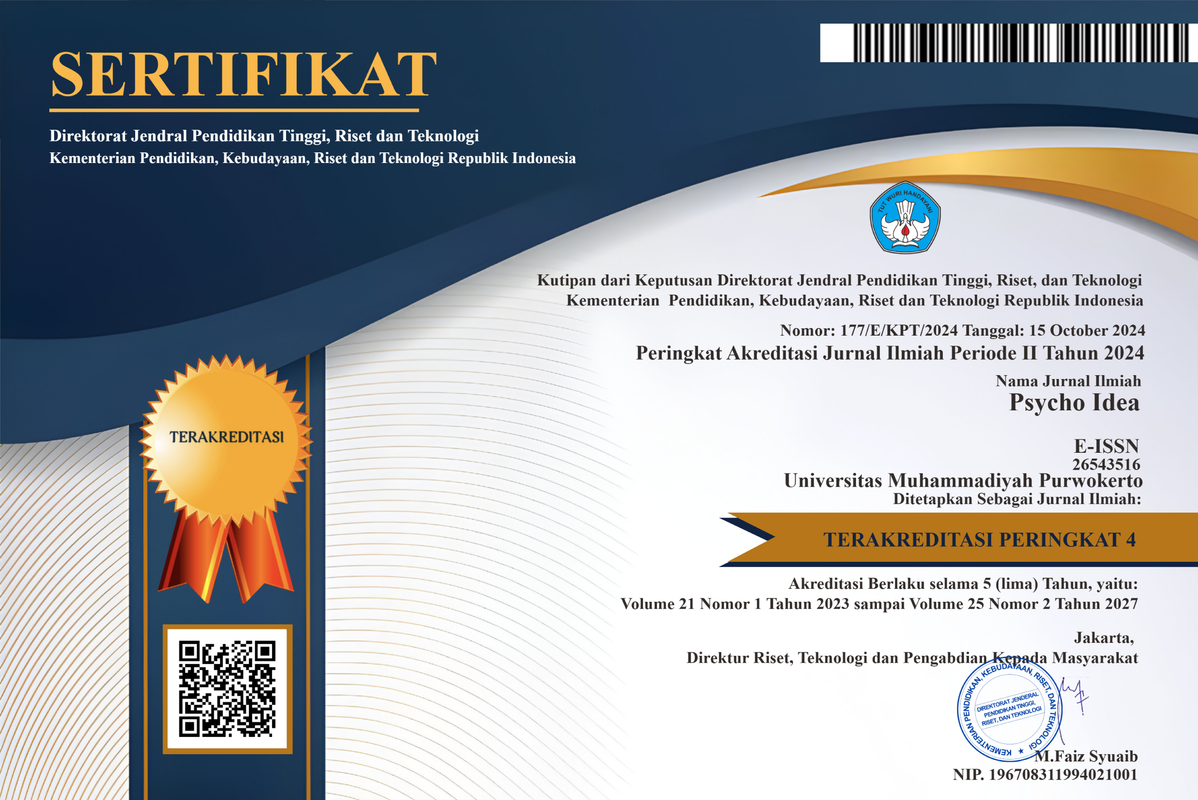LOGOTERAPI SEBAGAI PEMBENTUK SIKAP ANTI KORUPSI PADA MAHASISWA
DOI:
https://doi.org/10.30595/psychoidea.v16i2.3367Abstract
Penelitian ini bertujuan untuk menganalisis pengaruh pemberian logoterapi terhadap terbentuknya sikap anti korupsi pada mahasiswa. Metode penelitian yang digunakan adalah pre-eksperimental dengan rancangan one-shot case study. Pelaksanaan penelitian pada mahasiswa Psikologi Universitas Teknologi Yogyakarta dengan memberikan perlakuan berupa logoterapi. Pengambilan sampel dilakukan dengan metode simple random sampling dengan jumlah sampel sebanyak 30 responden. Pengumpulan data dengan skala sikap anti korupsi kemudian hasilnya diuji dengan menggunakan t-test. Hasil penelitian  menunjukkan bahwa untuk sikap antikorupsi mahasiswa thitung        sebesar 3,101 dengan P value 0,004 sehingga hipotesa diterima karena P value 0,004 < dari 0,05 (α) artinya sikap anti korupsi mahasiswa dapat dibentuk melalui logoterapi. Hasil tersebut sesuai dengan pandangan konsep logoterapi yang bertujuan untuk meningkatkan kemampuan individu dalam menemukan makna hidup serta kemampuan bertindak dan mengantisipasi diri terlibat dalam perilaku negatif atau korupsi.
Â
Kata Kunci : Logoterapi; Sikap anti korupsi; Mahasiswa
Â
ABSTRACT
This study aims to analyze the effect of providing logotherapy to the formation of anti-corruption attitudes on the students. The research method used is pre-experimental with one-shot case study design. Implementation of research on Psychology student of University of Technology Yogyakarta by giving treatment in the form of logoterapi. Sampling was done by simple random sampling method with total of 30 respondents. Data collection with a scale of anti-corruption attitudes is then tested using t-test. The result of the research shows that for student anticorruption attitude 3,101 with P value 0,004 so that hypothesis accepted because P value 0,004 <from 0,05 (α) mean student anti corruption attitude can be formed through logotherapy. The results are in accordance with the concept of logoterapi which aims to improve the ability of individuals in finding the meaning of life and the ability to act and anticipate themselves involved in negative behavior or corruption.
Â
Keywords: Logoterapi; Anti-Corruption Attitude; Student
References
Aghajani, F. (2015). The Effect of Group Counselling with Logotherapeutic Approach on Happiness and Quality of Life of Women Heads of Households. Jurnal UMP Social Sciences and Technology Management,3(1),273-281.
Alfaqi, Z. M., Habibi, M. M & Rapita, D. D. (2017). Peran Pemuda Dalam Upaya Pencegahan Korupsi dan Implikasinya Terhadap Ketahanan Wilayah (Studi Di Kota Yogyakarta, Daerah Istimewa Yogyakarta). Jurnal Ketahanan Nasional, 23(3), 320-337.
Ardtiyani, F. M & Kholifah, R. A. (2014). Penyuluhan Anti Korupsi Sejak Dini Pada Anak-Anak Dusun Babadan, Selomirah, Ngablak, Magelang, Jawa Tengah. Seri Pengabdian Masyarakat, 3(2), 81-85.
Bastaman, H.D. (2007). Logoterapi :Psikologi Untuk Menemukan Makna Hidup dan Meraih Hidup Bermakna, Jakarta: PT. Raja Grafindo
Djaja, E. (2010). Memberantas Korupsi Bersama KPK, Jakarta:Sinar Grafika.
Graydison, A. B & Budiani, S. M. (2013). Dampak Perilaku Korupsi Ditinjau Dari Stress Pada Keluarga Di Kabupaten Lombok Timur Selong-Nusa Tenggara Barat (NTB). Character: Jurnal Penelitian Psikologi, 1(2), 97-102.
Hamalik, O. (2011). Kurikulum dan Pembelajaran. Jakarta: Bumi Aksara.
Kurniawan, T. (2009). Peranan Akuntabilitas Publik dan Partisipasi Masyarakat dalam Pemberantasan Korupsi di Pemerintahan. Bisnis & Birokrasi. Jurnal Ilmu Administrasi dan Organisasi, 16(2), 116-121.
Sugiyono. (2012). Metode Penelitian Kuantitatif, Kualitatif dan R & D. Bandung: Alfabeta.
Sutedi, A. (2012). Hukum Keuangan Negara. Jakarta: Sinar Grafika
Sutejo. (2017). Pengaruh Logoterapi Kelompok Terhadap Kemampuan Memaknai Hidup Pada Residen Napza. Jurnal Ners dan Kebidanan Indonesia, 5(1), 27-32. http://dx.doi.org/10.21927/jnki.2017.5(1).27-32
Walgito, B. (2010). Pengantar Psikologi Umum. Yogyakarta: C.V. Andi. Offset.
Downloads
Published
Issue
Section
License
Authors published in this journal agree to the following terms:
- The copyright of each article is retained by the author (s) without restrictions
- The journal allows the author(s) to retain publishing rights without restrictions
- The author grants the journal the first publication rights with the work simultaneously licensed under the Creative Commons Attribution License, allowing others to share the work with an acknowledgment of authorship and the initial publication in this journal.
- Authors may enter into separate additional contractual agreements for the non-exclusive distribution of published journal versions of the work (for example, posting them to institutional repositories or publishing them in a book), with acknowledgment of their initial publication in this journal
- Authors are permitted and encouraged to post their work online (For example in the Institutional Repository or on their website) before and during the submission process, as this can lead to productive exchanges, as well as earlier and larger citations of published work
- Articles and all related material published are distributed under a Creative Commons Attribution-4.0 International Public License (CC - BY 4.0).
License
Psycho Idea is licensed under a Creative Commons Attribution- 4.0 International Public License (CC - BY 4.0).
You are free to :
Share — copy and redistribute the material in any medium or format
Adapt — remix, transform, and build upon the material for any purpose, even commercially











